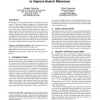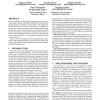121
click to vote
CIKM
2008
Springer
15 years 4 months ago
2008
Springer
In automated text categorization, given a small number of labeled documents, it is very challenging, if not impossible, to build a reliable classifier that is able to achieve high...
101
click to vote
CIKM
2008
Springer
15 years 4 months ago
2008
Springer
In this paper, we investigate the problem of improving the relevance of a Web search engine by adapting it to the dynamic needs of the user. We examine a representative case of su...
138
click to vote
AIRWEB
2008
Springer
15 years 4 months ago
2008
Springer
Every day millions of users search for information on the web via search engines, and provide implicit feedback to the results shown for their queries by clicking or not onto them...
132
click to vote
AIRWEB
2008
Springer
15 years 4 months ago
2008
Springer
The presence of Web spam in query results is one of the critical challenges facing search engines today. While search engines try to combat the impact of spam pages on their resul...
110
click to vote
FLAIRS
2007
15 years 4 months ago
2007
Web search engines like Google have made us all smarter by providing ready access to the world's knowledge whenever we need to look up a fact, learn about a topic or evaluate...
118
click to vote
PRICAI
2000
Springer
15 years 6 months ago
2000
Springer
As more information becomes available on the World Wide Web, it has become an acute problem to provide effective search tools for information access. Previous generations of search...
144
Voted
ECAI
2006
Springer
15 years 6 months ago
2006
Springer
This paper addresses the problem of categorizing terms or lexical entities into a predefined set of semantic domains exploiting the knowledge available on-line in the Web. The prop...
117
click to vote
CLEF
2006
Springer
15 years 6 months ago
2006
Springer
We here describe the subword approach we used in the 2006 ImageCLEF Medical Image Retrieval task. It is based on the assupmtion that neither fully inflected nor automatically stem...
127
click to vote
CIVR
2006
Springer
15 years 6 months ago
2006
Springer
Abstract. We combine in this paper automatic learning of a large lexicon of semantic concepts with traditional video retrieval methods into a novel approach to narrow the semantic ...
116
click to vote
CIKM
2006
Springer
15 years 6 months ago
2006
Springer
This work addresses two common problems in search, frequently occurring with underspecified user queries: the top-ranked results for such queries may not contain documents relevan...


